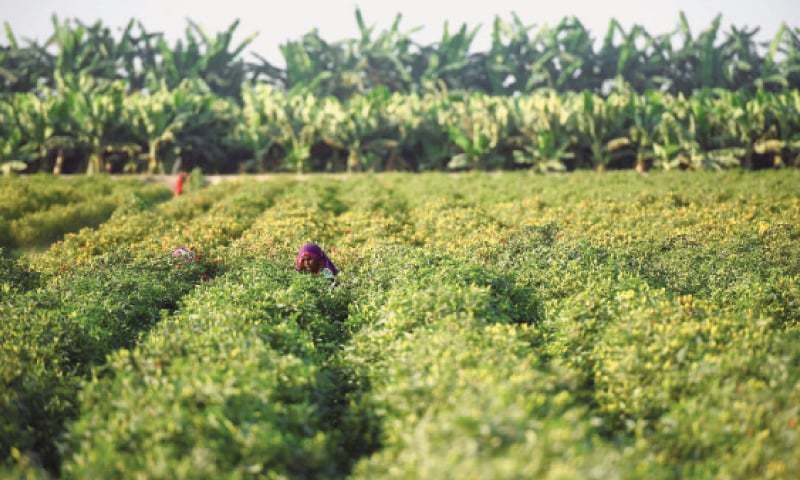ISLAMABAD: A new analysis carried out by a team of scientists at the International Maize and Wheat Improvement Centre (CIMMYT) has shown benefits of conservation agriculture for crop performance, water use efficiency, farmers’ incomes and climate action across a variety of cropping systems and environments in South Asia.
The analysis, published in ‘Nature Sustainability’, is the first of its kind to synthesise existing studies on conservation agriculture in South Asia and allows policy makers to prioritise where and which cropping systems to deploy conservation agriculture techniques. The ‘Nature Sustainability’ publishes the best research about sustainability from the natural and social sciences.
The analysis used data from over 9,500 site-year comparisons across South Asia. Scientists looked at a variety of agricultural, economic and environmental performance indicators — including crop yields, water use efficiency, economic return, greenhouse gas emissions and global warming potential — and compared how they correlated with conservation agriculture conditions in smallholder farms and field stations across South Asia.
Researchers found that many conservation agriculture practices had significant benefits for agricultural, economic and environmental performance indicators, whether implemented separately or together.
International Maize and Wheat Improvement Centre completes 60 years of research partnership with Pakistan
Zero tillage with residue retention, for example, had a mean yield advantage of around 6 per cent, provided farmers almost 25 per cent more income, and increased water use efficiency by about 13pc compared to conventional agricultural practices. This combination of practices also was shown to cut global warming potential by up to 33pc.
This comes as good news for national governments in South Asia, which have been actively promoting conservation agriculture to increase crop productivity while conserving natural resources. South Asian agriculture is known as a global “hotspots’ for climate vulnerability, according to the analysis.
With the region’s population expected to rise to 2.4 billion, demand for cereals is expected to grow by about 43pc between 2010 and 2050. This presents a major challenge for food producers who need to produce more while minimising greenhouse gas emissions and damage to the environment and other natural resources.
“The collaborative effort behind this study epitomises how researchers, policy-makers, and development practitioners can and should work together to find solutions to the many challenges facing agricultural development, not only in South Asia but worldwide also,” said Jon Hellin, leader of the Sustainable Impact Platform at the International Rice Research Institute (IRRI).
Meanwhile, CIMMYT has completed in 2020 its 60 years of research partnership with Pakistan, playing a vital role in improving food security for Pakistanis and for the global spread of improved crop varieties and farming practices.
Dr Norman Borlaug, Nobel Peace laureate and first director of CIMMYT wheat research, kept a close relationship with Pakistan’s researchers and policymakers. The high-yielding, white-grain wheat variety “Mexi-Pak” from CIMMYT addressed the national food security crisis when Pakistan imported 50 tons of Mexi-Pak seed in 1966, the largest seed purchase of its time, and two years later became the first Asian country to achieve self-sufficiency in wheat, with a national production of 6.7 million tons.
In 2019, Pakistan harvested 26m tons of wheat, which roughly matches its annual consumption of the crop, CIMMYT says.
Since 1965, Pakistan has released 140 improved wheat varieties for use by farmers. Each year, CIMMYT provides approximately 25,000 new wheat lines to strengthen national wheat breeding for disease resistance, drought and heat tolerance, higher yields, and bio-fortification. More than 70pc of all wheat varieties grown in Pakistan come from collaborations with CIMMYT.
Almost 36 high-yielding, heat and disease resistant varieties released over the last six years have contributed to a 20pc gain in farmers’ wheat yields. A 200pc increase in the number of wheat crosses has led to more varietal releases. Bio-fortified wheat varieties that carry enhanced levels of zinc in the grain are now grown on half a million hectares, contributing to better nutrition among those who cannot afford diverse diets.
In maize, a network of partners has tested and deployed more than 3,000 improved varieties and hybrids across 300 environments. Using CIMMYT parental lines, Pakistan took the lead in South Asia in releasing two new hybrids of quality protein maize, whose grain features enhanced levels of the essential protein-building amino acids, lysine and tryptophan.
Published in Dawn, April 27th, 2020














































